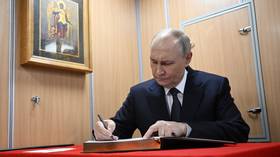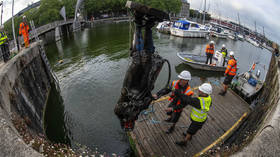Siberian investigators dispute claims that Navalny’s team transported Novichok-laced water bottle to Berlin

The alleged poisoning of Russian opposition figure Alexey Navalny took a new twist on Thursday, when Russian investigators contradicted assertions that a bottle with traces of Novichok was sent to Germany.
Top Siberian cop Sergey Potapov said that security at Novosibirsk airport did not find any large bottles in the luggage of Navalny’s associates when they flew to Tomsk after the activist was taken to hospital. The Moscow protest leader’s team previously asserted that they took “everything that could be hypothetically useful [from his Omsk hotel room], and passed it on to doctors in Germany.”
Also on rt.com OPCW says it found traces of Novichok-class substance in blood & urine samples of Russian opposition figure Alexey NavalnyNavalny was taken to Berlin on August 22, just two days after he fell ill during a flight to Moscow. His colleague at the Aniti-Corruption Fund (FBK), Maria Pevchikh, said that, because there were no direct flights available from Tomsk to Omsk, she took his personal belongings to Novosibirsk by car, and then flew by plane to Omsk, and later onto Germany.
Pevchikh stated that the items gathered including a bottle of water, on which German experts later supposedly found evidence of a Novichok-class nerve agent. Popatov, whose full title is Interior Ministry Deputy Director of the Investigative Department of the Transport Department for the Siberian Federal District, has now dismissed Pevchikh’s story.
“Some information emerged in the media that these objects (bottles containing water) were transported by car and plane from Tomsk to Germany. At the same time, the investigative agencies objectively found out that Maria Pevchikh, together with Georgy Alburov, after Navalny’s hospitalization, travelled from Tomsk to Novosibirsk by car and then to Omsk by plane,” he explained.
“As Maria Pevchikh went through pre-flight checks in Tolmachevo (Novosibirsk) Airport, her suitcase and backpack did not have any liquid containers of over 100 milliliters, including any bottles of water.”
Also on rt.com UK says ‘we haven’t yet attributed’ Navalny’s alleged poisoning to Kremlin, but Moscow must ‘ANSWER’Siberian police, who are handling the Russian probe, have not received answers from FBK employees about the circumstances around the hospitalization of Navalny, he added. “The employees of the Anti-Corruption Foundation and other people who accompanied Navalny during the trip still have many questions to answer,” Potapov told reporters. “The investigation is clarifying what exactly they did in Navalny’s hotel room, why they removed objects that could have been classified as evidence in the probe (including water bottles) and how they transported them.”
Potapov also asserted that the investigation is trying to locate of Pevchikh, who lives permanently in Britain. On August 22, the investigator claims, she refused to be questioned and left Omsk for Germany.
Navalny’s Anti-Corruption Foundation had earlier explained that they had managed to get to his hotel room in Tomsk, after the opposition figure became ill aboard the plane, and recovered water bottles from there. Pevchikh allegedly took one of these to Germany, where experts eventually ruled that the bottle contained traces of a toxic, ‘Novichok’-like substance.
The investigator also declared that a false bomb alert delivered to Omsk airport on the day of Navalny's alleged poisoning came from Germany. Potapov said the anonymous message was sent via a temporary e-mail service, the servers of which are located in Germany. He added that Russian cops have sent a request for legal assistance to Berlin, hoping to identify whoever sent the message.
Also on rt.com Germany & France will ask EU allies to place fresh sanctions on Russia over alleged poisoning of opposition figure NavalnyNavalny was rushed to a local hospital in Omsk on August 20 after collapsing on a Moscow-bound flight from Tomsk. He fell into a coma and was put on a ventilator in an intensive care unit. On August 22, he was airlifted to Berlin and admitted to the Charité hospital.
On September 2, German officials claimed that, having examined Navalny’s test samples, their state toxicologists had come to the conclusion that the activist had been affected by a toxic agent belonging to the Novichok family.
Kremlin Spokesman Dmitry Peskov said that Russia was ready for comprehensive cooperation with Germany. He pointed out that no poisonous substances had been detected in Navalny’s system prior to his transfer to Berlin.
On October 6, the Organisation for the Prohibition of Chemical Weapons (OPCW) confirmed that biomarkers of the cholinesterase inhibitor found in Navalny’s blood and urine samples have structural characteristics similar to the toxic chemicals added to the Chemical Weapons Convention’s Annex on Chemicals in November 2019.
If you like this story, share it with a friend!














